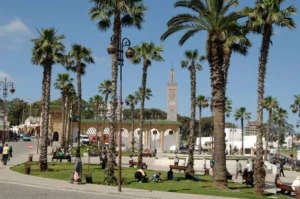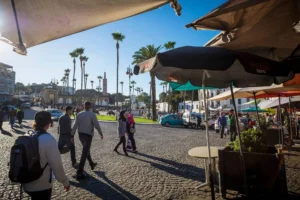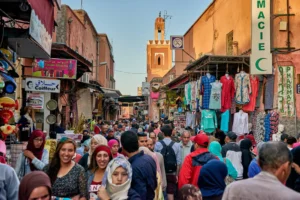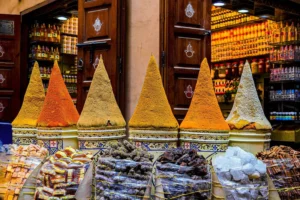What is the Medina of Marrakesh?
If you ever visit Tangier, Medina is a must-visit destination. Around three hundred years ago, the Medina of Tangier was built as a fortified line of defense to keep the city safe from attackers.
It eventually became the city’s center, with narrow lanes lined with busy souks where inhabitants sold everything from spices and fabrics to handcrafted products.
People worldwide came to Medina in the 20th century, especially after Tangier became an international zone (1923–1956). That’s why Tangier is a city where cultures mix together because of its history.
Medina is where you can feel how this Moroccan market mixes history and culture. For me, this was more than just a tourist attraction; it was a place where residents could celebrate and share their past.
The market is still busy today, mixing old and new things to give visitors a unique look into Morocco’s past and present.
The Medina is where you can truly experience the atmosphere of Morocco, whether you’re shopping or simply wandering about.
Why is the Medina of Tangier Important?
Medina is a place that mixes history and culture in a way that is hard to describe. It shows how people used to live in Morocco, with small streets, old gates, beautiful mosques, and churches. Folks worldwide have been coming to Medina for years because of Tangier’s unique geological placement.
As I said before, In the 20th century, artists and writers such as Paul Bowles, William S. Burroughs, and Tennessee Williams were drawn here. It was easy for them to grow their imagination in Medina because it had a lot of different cultures and a mysterious feel to it.
Even though the city has grown a lot since then, the Medina has kept its old-fashioned beauty. Hundreds of years old, houses, souks, and customs have been passed down for generations.
This makes a unique situation, and travelers worldwide come to see Morocco as it was hundreds of years ago. It is still a real cultural treasure that gives people an honest look into the past.
Things to Do in the Medina of Tangier
The Medina of Tangier is a treasure trove of experiences, offering a variety of things to see, do, and explore. Whether you’re an avid shopper, a history enthusiast, or simply someone who enjoys soaking in the atmosphere, the Medina has something for everyone. Here are some of the top things to do in this vibrant neighborhood:
What to Expect in the Souks
Small shops selling all sorts of things can be found in the souks, the heart of the Medina. Walking through the small streets, you’ll see goods showing Morocco’s traditional skills and workmanship. Morocco makes beautiful leather goods by hand, like shoes and bags.
They also make colorful carpets and woven fabrics. These things are great as gifts because they each have a story about Moroccan culture.
The air in the souks smells like spices. The souks have so many smells, from saffron to cumin to turmeric and many other fragrant spices. You can also buy traditional herbs you can use in cooking or even take home as a gift.
Silver jewelry with detailed designs can be found in the Medina, especially the unique Berber pieces. These well-made items are a great deal and show how craftspeople in Morocco used to make things.
There are shops in Medina that only sell old things. There are old coins, pots, and brassware that give you a look into Morocco’s rich culture past. You can fully experience Tangier’s rich cultural and historical scenery by exploring the Kasbah, walking through the souks, or just taking in the energy of the Grand Socco.
Visit the Kasbah
Every person who comes to Medina has to see the Kasbah. Kasbahs are defensive buildings, also called citadels, popular in Morocco and other parts of North Africa. A Kasbah used to be the home of a military leader or a family in charge of the government.
In addition, it was built as a fortress that was simple to protect. Kasbah comes from the Arabic word “qasbah,” which means a strengthened place or castle.
The castle from the Middle Ages has stunning views of the city and the Mediterranean Sea. So, it’s a great place to take pictures during a trip. Check out the Kasbah Museum.
Archaeological finds from the Roman, Arab, and Berber times show Tangier’s long and interesting past. The museum is educational and makes the Kasbah look even more beautiful.
See the Grand Socco
The Grand Socco, the central plaza of the Medina, is a popular gathering area for locals and tourists. Tangier’s vivid spirit can be felt in this square. Sometimes, this place hosts performers with musicians and street artists.
If you are lucky, you will find the unique culture of Medina through their performance. You will also find vendors offering local cuisine and handcrafted goods and cafés to sit and relax as the world goes by. This feeling of relaxation is something else.
Stroll Through the Streets
One of the most significant ways to enjoy the Medina is to wander through its small, twisting lanes. As you stroll, you’ll see local residents selling various items, from food to clothing.
Here, you will feel the authentic Moroccan life around you. You can talk with the locals and see the historical impact of Medina. The welcoming vibe of this market is something I love.
Visit the Zoco Chico
If you want a more authentic and local experience, visit Zoco Chico. This market primarily serves locals. Unlike the tourist Grand Socco, Zoco Chico offers affordable-priced things like fresh fruit, authentic Moroccan spices, and daily necessities.
You may buy things at a cheap price if you want to buy souvenirs. Overall, this is an excellent spot to experience authentic Morocco.
Famous Shops in the Medina
The Medina of Tangier is home to a variety of famous shops, each offering unique products that reflect the city’s rich cultural heritage. Whether you’re looking for souvenirs local crafts, or simply want to experience the local shopping scene, here are some must-visit shops in the Medina:
Al-Jazeera
One of the best places to buy real Moroccan goods is Al-Jazeera. It’s a boutique store in Medina. People know Al-Jazeera for its beautiful jewelry, pottery, leather goods, and fabrics that are all made by hand.
This is the ideal spot to find a one-of-a-kind souvenir for you or your friends and family. Small jewelry items cost 100 MAD ($10 USD), while hand-painted pots and bigger items cost 500 MAD ($50 USD). Visit this place for yourself to understand why I put Al-Jazeera on my list.
Marché aux Épices
The Marché aux Épices (Spice Market) is the place to go if you love flowers and spices that smell good. There are so many colors and smells in this market. There are stands in this market that sell saffron, cumin, dried rose petals, and Moroccan mint tea, among other things.
It’s too much to take in but in a good way. It’s also a great place to find something unique to cook with or take home. Prices for spices usually run from 20 MAD ($2 USD) for small amounts to 100 MAD ($10 USD) for high-quality saffron and other premium spices.
Tangerina Café
Tangerina Café is an ideal spot if you want a break from the bustling streets. It’s not only a café but also a boutique where you can find local artisanal products. You should enjoy a refreshing cup of Moroccan mint tea (around 20 MAD or $2 USD) while browsing beautiful handcrafted jewelry, pottery, and textiles.
The items here typically range from 50 MAD ($5 USD) for smaller pottery items to 200 MAD ($20 USD) for higher-end products like handwoven textiles. Which is really cheap if you ask me.
Dar el-Achab
Dar el-Achab is the place to visit if you are looking for traditional clothing. This shop is known for its unique selection of djellabas and kaftans. This is the perfect pick for a beautifully made garment that reflects the rich heritage of Morocco.
These traditional garments cost around 200 MAD ($20 USD). However, for custom or high-end pieces, the price could reach 600 MAD ($60 USD) or more.
Artisans du Maroc
Artisans du Maroc is a gem if you’re looking for traditional souvenirs. This boutique offers a carefully selected collection of hand-painted ceramics, leather goods, and traditional lamps.
The prices are also reasonable. Smaller items, like pottery, start at 100 MAD ($10 USD); with larger and more intricate pieces, this could go up to 300 MAD to 500 MAD ($30 to $50 USD).
Restaurant Casa d’Italia
If you are hungry and want something unique, head to Restaurant Casa d’Italia. This unique restaurant offers delicious dishes that blend traditional Moroccan flavours with Italian classics. I suggested this beautiful eatery because it combines the best of both culinary worlds.
A meal here typically costs between 80 MAD and 150 MAD ($8 to $15 USD). The main courses, like pasta or tagine, are priced at around 100 MAD ($10 USD).
Café Hafa
For a truly iconic experience, Café Hafa is one of the most famous spots in Tangier. While not exactly inside the Medina, it’s just on the edge. It’s the perfect place to relax after exploring the Medina’s winding streets.
You can enjoy the Mediterranean Sea’s beautiful views while enjoying a cup of Mint tea. Café Hafa is known for its mint tea (15 MAD or $1.50 USD).
La Maison de la Photographie
La Maison de la Photographie is a must-see If you appreciate art and history. This small photography museum is located in a traditional Moroccan house in Medina. This museum also has a shop where you can buy prints of historical photographs of Tangier and Morocco.
Prices for prints range from 100 MAD ($10 USD) to 300 MAD ($30 USD), depending on the size and rarity.
Big Souk
Finally, Souk Dakkel, or the Big Souk, is a bustling market that captures the essence of the Medina. Here, you’ll find everything from fresh produce to traditional carpets, metalworks, and antiques.
Prices can be widely in this market. Smaller trinkets or souvenirs start at 50 MAD ($5 USD), and larger items like handcrafted carpets or antique metalwork can cost up to 1,000 MAD ($100 USD).
What to Eat in the Medina of Tangier
Traveling through the Medina of Tangier isn’t just about seeing and hearing things; it’s also about tasting delicious Moroccan food. As I walked down the busy, narrow streets, I couldn’t help but be drawn into the small cafés and restaurants that served the most real and tasty food. The ones you have to try when you go are listed below:
Tagine
Tagine was one of the Moroccan dishes that I really enjoyed among the different dishes I tried. So, Tagine is basically a stew that is commonly served in a traditional clay pot. This traditional food is made with either chicken or lamb, and veggies are added too.
This dish contains a hidden flavour blast deep inside. Because of the combination of soft meat, fragrant herbs, perfectly cooked spices, and veggies, you will feel a unique balance of taste.
I tried chicken tagine, which was cooked with preserved lemons and olives. It came with fluffy rice on the side. It’s a comfort food that tastes like it was made with care for generations. A tagine meal costs between 70 and 150 MAD.
Couscous
If you visit the Medina on a Friday, don’t miss out on couscous, a mainstay of Moroccan Cuisine. It is served with a variety of veggies in a flavorful soup. There are many ways of cooking this; different veggies could be used, but the taste was pretty unique for me.
Eating couscous is like eating Morocco’s heart—simple, healthy, and filled with affection. It’s affordable; I had my fill at a neighbourhood restaurant for around 50 MAD.
Mint Tea 
While roaming the Medina, I couldn’t resist stopping at a café to have the famed Moroccan mint tea. It was sweet and refreshing, served in little cups. Highly recommended. Seeing the neighbourhood vendors pour tea from a great height to make the perfect foam was amusing.
Mint tea is widely available in cafés and costs between 10 and 20 MAD. A nice, refreshing pick-me-up while exploring the Medina.
Pastilla 
Another unique dish I encountered was the pastilla. The pastry was flaky, delicate, and wrapped around a chicken filling (though some versions use pigeons).
What amazed me was the perfect balance of savoury and sweet flavours.
It was dusted with powdered sugar and cinnamon, giving it an almost dessert-like feel. The best part is that it’s both rich and light at the same time. For 40 to 80 MAD, it’s a treat, unlike anything I’ve ever tasted.
Briouats
As I wandered through the market, I got the aroma of boats. I found this crispy fried pastry filled with either meat or cheese irresistible.
I had the cheese-filled briouats, which were crunchy on the outside and creamy on the inside. These are perfect for a quick snack as you explore or a side dish with your meal. You can grab a plate for around 30 to 60 MAD.
Seafood
Tangier has a lot of fresh fish because it is on the coast. When I went to a small fish place, I had grilled sardines with a fresh salad and a squeeze of lemon.
The fish was soft and tasty; you could taste the sea in every bite because it was so fresh. Usually, grilled sardines or other fresh fish typically cost between 50 and 100 MAD, making it a great and cheap choice for seafood fans.
A straight way to get to the heart of Tangier’s food culture is to eat meals like tagine and pastilla and drink mint tea. Morocco has a lot of different kinds of pasta, and each dish has its own unique flavours.
What to Get (Souvenirs)
An amazing thing about visiting the Medina of Tangier is that you can always find beautiful, real gifts that show off Morocco’s rich culture. The Medina is a great place to find one-of-a-kind things, whether you want to buy something for yourself or as a gift. Here are some of the best things to bring back with you:
Moroccan Rugs
I believe no trip to Morocco would be complete without taking home a lovely handmade rug. People love Moroccan rugs, especially Tangier ones, because they have beautiful patterns, bright colours, and a long past. Every rug has its own story, which is often based on the area it came from or the customs of the weaver’s tribe.
Small rugs start at about 300 MAD (~30 USD), while more significant, more complicated ones can cost between 1,000 MAD (~100 USD) and 3,000 MAD (~300 USD), based on how well they are made and how big they are. People expect to bargain, so don’t be afraid to do it!
Leather Goods 
Leather goods from Morocco are famous for being of high quality. The best place to buy them is Medina. The leather goods here are well-made and will last, from wallets and jackets to bags and shoes.
I bought myself a soft, hand-stitched leather bag which cost me about 500 MAD, or $50 USD. The prices of leather goods vary greatly, starting at 150 MAD ($15 USD) for small items like wallets and going up to 1,000 MAD ($100 USD) or more for bigger items like bags or coats.
Spices
As you stroll through the Medina, you can smell the exotic spices. If you like to cook, you should bring some Moroccan spices back with you. You will get many different aromatic spices at the market. Spices like paprika, cumin, ginger, and cinnamon are widely available.
I bought a small pouch of saffron for 150 MAD, which is about 15 USD. Since then, it’s been an essential ingredient in my kitchen. Spices range from 30 to 100 MAD (about 3 to 10 USD) for a set, depending on the kind and amount. This Price could go higher if you select exotic spices.
Moroccan Lamps

If you want to buy Moroccan decor, you may get the magnificent Moroccan lamps. These lamps are usually brass or cast iron, creating a unique atmosphere. They typically have elaborate designs and give off a soft, moody glow.
Various sizes are available, ranging from small table lights to enormous lanterns. For small lights, the price range starts at 150 MAD, which is about 15 USD. More significantly, more artistic lamps can cost between 500 MAD and 1,000 MAD.
Argan Oil Products
If you want to buy a skincare product, pure argan oil is one of the most excellent options available in Morocco. Moroccan women use argan oil daily because it is known to be great for hair and skin.
It comes in many forms, such as shampoo, creams, or pure oil. A small bottle of pure argan oil costs about 10 to 20 USD. You can take it home as your natural skin care substitute. You will find Lotions and soaps made with argan oil in many stores. These items range from 50 MAD (USD 5) to 200 MAD (USD 20).
From the spices of Morocco to handmade leather goods, every item is a reminder of the craftsmanship and history that defines the Medina. Bringing home a piece of Tangier means carrying a bit of its soul with you.
What to Expect
Vibrant Atmosphere
As soon as you walk into Medina, you’ll be surrounded by a busy, hectic, and charming atmosphere. People are selling their goods all along the small streets. Kids will run back and forth between the people, donkeys, and carts going through the pathways. There are a lot of sounds from local sellers trying to sell their goods, and sometimes, someone will yell to make room for carts to pass.
I won’t lie; it was a little overwhelming for me at first. But for some time, I got settled in the chaos because I was a part of it. Also, this is all part of the experience. This is Morocco at its most genuine. You won’t find it anyplace else in Tangier.
Street Performers and Music
You’ll quickly realize that Medina is more than simply a shopping destination. It also serves as an entertainment hub. Street performers are familiar to see when walking around the streets. Musicians, dancers, and even traditional drummers provide a dynamic vitality to the scene.
Some regions, especially around Grand Socco, are famed for spontaneous musical performances. So get ready to hear some local music.
Local Life
You can get a real feel for local life in the Medina, which is one of its most appealing features. You’ll see store owners opening their doors or giving free samples, tea vendors selling sweet and cool mint tea, and people going about their daily lives.
It’s a living, breathing place where the cultural heart of Tangier beats. You’ll really get a feel for the flow of life in Morocco. As opposed to the city’s more touristy spots.
Bargaining
Negotiating with local sellers is an important part of Medina’s experience. It’s common to haggle for a better deal, and prices aren’t always set. Vendors are always ready to listen to your offer. Don’t be afraid or uncomfortable to state your offer. Don’t be shocked or upset if the seller initially gives you a high price. It’s all part of the game. If you want to negotiate, be polite and friendly. A smile can go a long way.
First, you should throw a low ball and slowly raise it. You can also agree on a price and stick to it. Negotiating isn’t your thing? Don’t worry—you can always leave. The seller will probably call you back with a better deal. You’ll feel like you’ve become a part of the local culture, and it’s a fun way to shop.
The Medina of Tangier will surprise you at every turn, whether it’s the street performers adding music to your stroll or the vibrant life unfolding around you. Prepare to immerse yourself in the full sensory experience that is uniquely Tangier.
Things to Keep in Mind
While the Medina of Tangier offers an unforgettable experience, there are a few things to remember to ensure a smooth and enjoyable visit. From safety to cultural etiquette, here are some important tips:
Safety
Most of the time, the Medina is safe for tourists, but it’s always a good idea to be careful in any busy market place.
Many people are targets for pickpocketing, so keep your goods close and don’t show off expensive things like jewelry or cameras.
When navigating through tight alleys, having your bags zipped or carried in front of you is smart. You may have a wonderful time without any problems if you just be careful.
Respect Local Culture
Morocco is a Muslim country. Tangier is more open-minded than most Moroccan towns, but it’s still important to follow the rules.
Dress modestly while visiting mosques or religious institutions. Both men and women should cover their shoulders and knees when visiting cultural places
When in doubt, it is usually preferable to dress modestly to avoid attracting unwanted attention.
Best Time to Visit the Medina
Spring (March–May) and fall (September–November) are the ideal times to explore Tangier. The days are warm and the nights are cool, making these times of the year great for walking around the Medina.
It can get hot in the summer and rainy in the winter, so if you want cooler weather, go during the middle seasons. Are you ready to discover Tangier’s heart? You can learn about the Medina’s long past, lively culture, and endless wonders when you visit. Start making plans for your trip and make experiences that will last a lifetime.
Read my other blogs.
Common Layover to Morocco: Best Casablanca Guide
























































































